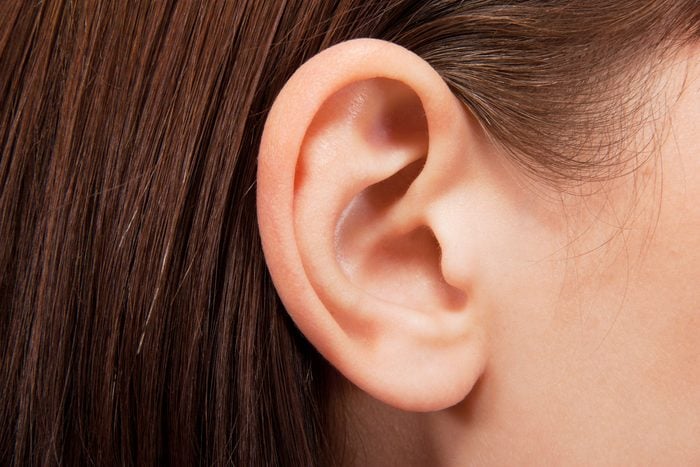
First: Find the underlying problem
A treatable medical condition might be behind the sound you’re hearing, says oto-neurologist Michael J. A. Robb, MD, a past director of the American Tinnitus Association. An ear infection, Ménière’s disease, blood flow problems, or even dental issues could cause you to hear the noise, he says. Make sure you rule out all the possibilities with a doctor before accepting tinnitus as part of your life. Below, you’ll find tinnitus cures to try.
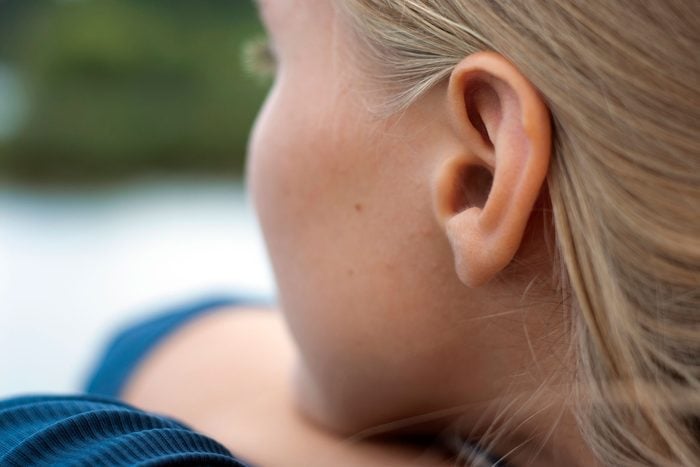
White noise
Feeding your brain more sound calls attention away from the ringing in your ears. “If you were in a restaurant and had candles on the table, you’d see them but wouldn’t be focusing on them,” says LaGuinn Sherlock, Au.D., research audiologist and former director of the Board of the American Tinnitus Association. “But if the lights went off, you’d have to pay attention to them because there’s a sharp contrast between light and dark.” For a similar reason, your tinnitus could reduce or go away entirely while you have white noise playing in the background.
Learn about the science behind your hearing loss.

Classical music
If you find white noise annoying—a bothersome sound will leave you aggravated instead of relieved—play a bit of music for a tinnitus cure. Neutral tunes will give your brain something else to focus on, like white noise does. You can pick any genre, but stick to instrumental versions. “Lyrics are words, words have meanings, and the brain gets distracted more easily,” says Norma R. Mraz, AuD, director of Mraz Audiology Consulting in Alpharetta, GA. “With instrumental versions with no lyrics, your focus can be the task at hand.”
These are the best songs to help you sleep, according to science.
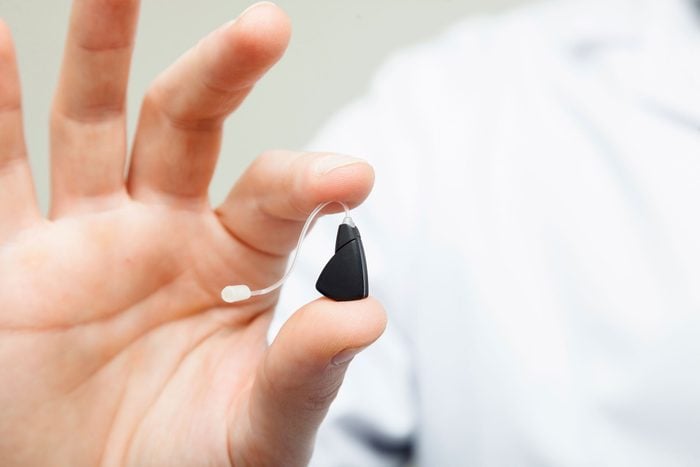
Invisible earphones
Wearing headphones to feed you music or white noise when you’re at work or socializing probably won’t go over well, so consider investing in a wearable device. They fit like a hearing aid but feed your ears a low-level noise that’s “quieter than a whisper,” Dr. Robb says.
Read up on these strange body parts and their surprising purposes.
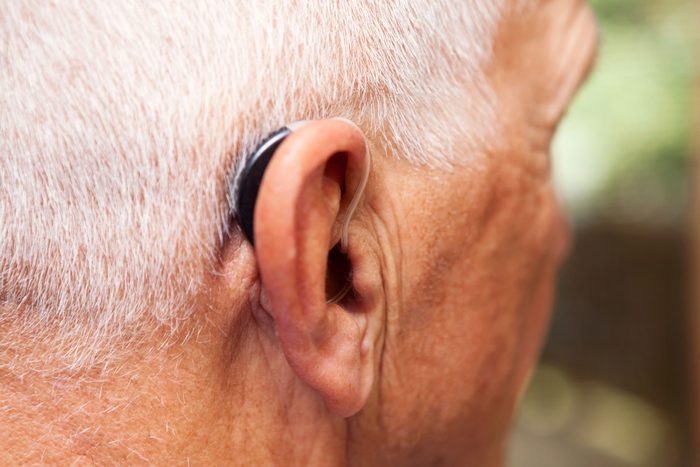
Hearing aids
Even if you think your hearing is perfectly fine, visit an audiologist. Hearing loss causes your brain to work overtime to listen, which in turn amplifies the noise from tinnitus, so you might benefit from one of these tinnitus cures, more specifically a hearing aid. “We hear with the brain and not with the ears. Ears collect the sound and the brain interprets it,” Mraz says. “With a hearing aid, you hear the outside world more than the internally generated sound.” Once your brain stops straining so hard to hear outside noise, the noise from inside your head could start to fade away.
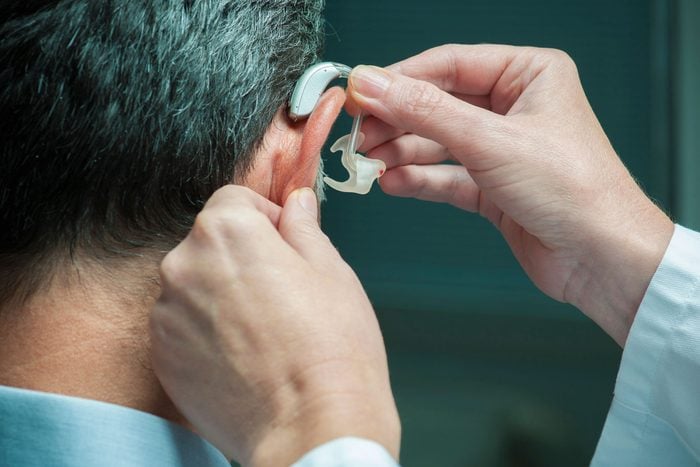
A just-in-case hearing aid feature
No need to decide between two different devices—most hearing aid companies offer a feature called “tinnitus sound generator” or “tinnitus masker.” “Even if a patient has just hearing loss, they never have to turn on the sound generator, but it’s there,” Mraz says.
Here’s why you should think twice before cleaning your ears.
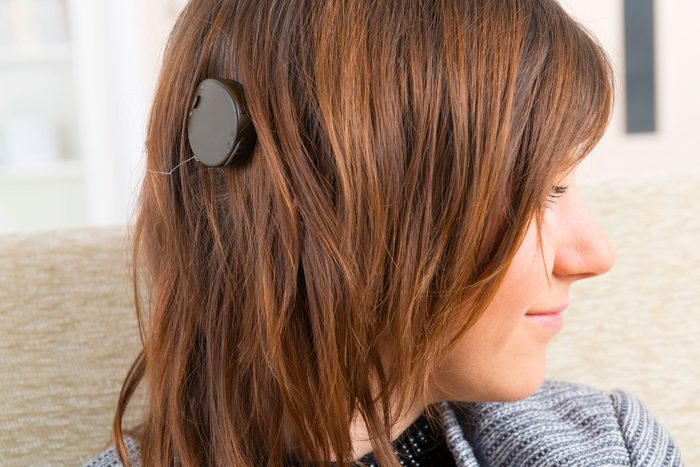
Cochlear implants
One of the tinnitus cures that patients who have complete deafness can consider is cochlear implants, which are devices placed surgically in the ear to bring back their hearing. Reintroducing outside noise could help in the same way hearing aids do, by giving the brain more to focus on. The American Tinnitus Association says cochlear implants are usually available only to people who have lost all hearing, but Dr. Robb says they can work for those who are deaf in just one ear too.
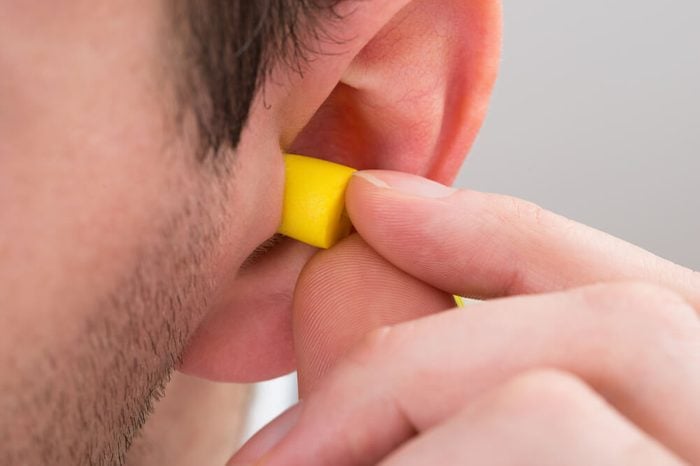
Earplugs
“Tinnitus is often an early sign of damage to the auditory system,” Sherlock says. “There might not be hearing loss yet, but it could be coming.” Whenever you’re in a loud place—attending a concert, using a leaf blower, or visiting a loud bar—make sure to protect your ears. And don’t worry, earplugs won’t make you miss out on the fun. Some earplugs block out all noise, which is perfect when you’re mowing the lawn, but others filter out sound without muffling the music or conversations you want to hear, Mraz says.
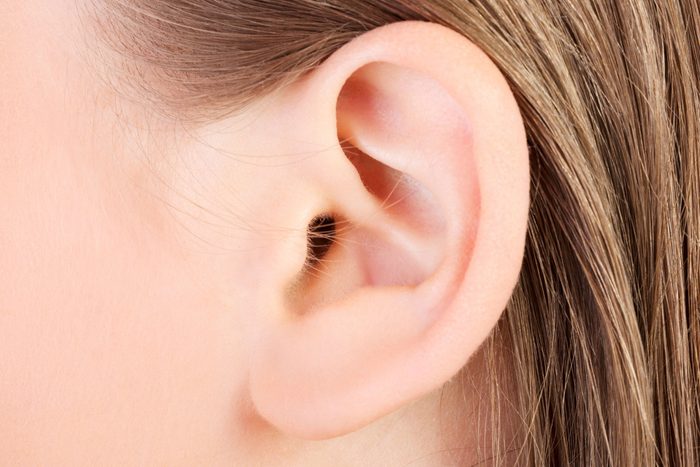
Neuromonics
Using special music with therapeutic sound frequencies, a neuromonics device is a tinnitus cure that trains your brain to pay attention to the noise it’s delivering. Your brain will start making new neural connections so that it pays less attention to the tinnitus. “The downside is some of these devices are so expensive and insurance doesn’t help pay for it,” Dr. Robb says.

Cognitive behavioural therapy
Cognitive behavioural therapy is often used to address phobias, but it can also benefit those with tinnitus, even if the expert doesn’t necessarily specialize in tinnitus, Sherlock says. You’ll learn techniques like deep breathing or muscle relaxation to use when you’re in a moment of high anxiety to change the way you react to the condition. “It’s flipping ‘I hate this’ into ‘This makes me uncomfortable, but I can deal with it,’” Dr. Sherlock says. But if you’re still in crisis mode, you might react badly to the therapy and should wait a couple months before starting CBT, Dr. Robb says.
Find out how to get the most out of therapy.

Tinnitus retraining therapy
Tinnitus retraining therapy is one of the tinnitus cures that’s specific to the disorder. By combining sound therapy with education, experts help make the condition less scary, Sherlock says. “The goal of education is to demystify tinnitus,” she says. “Once they know what the threat is or isn’t, over time the brain is much less likely to keep reacting to it.”
Watch out for these signs you should consider seeing a therapist.

Tinnitus activities treatment
Tinnitus activities treatment uses the same principles of education and sound therapy and targets the session toward a patient’s specific problems, Sherlock says. “If a patient’s primary problem is they can’t concentrate, they might go in for one or two sessions to… discuss activities to help concentrate,” she says.
Make sure to steal these secrets from people who never get sick.

Medications to calm down
Although no medicine will directly treat the noise you’re hearing and act as a tinnitus cure, anti-anxiety drugs might be helpful if the sound has you at wit’s end, Dr. Robb says. “If tinnitus patients have the chance to discuss medications with their physician, they should do that, especially in the early stages and if they can’t sleep and are anxious or fearful or on alert or in pain,” he says. But if you’re going to start a behavioural therapy, be careful not to take them too much, because they could slow down your progress, he warns.
Here are the silent signs of high-functioning anxiety.

Massage
Sometimes, built-up neck or jaw tension or an injury can aggravate tinnitus, but a chiropractor or physical therapist could help. “Working on that spasm or joint disorder may soften tinnitus to a lower level,” Dr. Robb says. Just make sure the muscles are worked gently—violent, rapid twists will only aggravate the condition, he says.
Next, learn about the strange symptoms that can signal a serious disease.